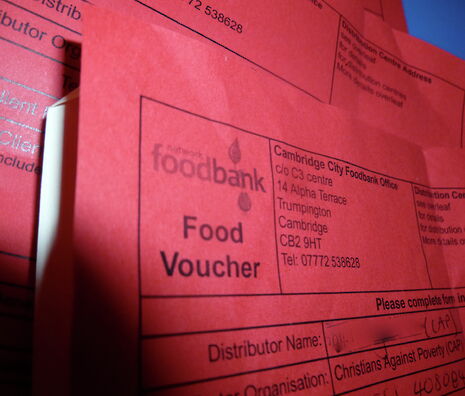Foodbanks cannot solve poverty
Foodbank poverty demands political change, Tom Belger argues: not charitable pity
In recent years, ‘foodbanks’ distributing donated food supplies to those in need have sprung up in Cambridge and across the UK. Half a million people are expected to be using them by 2015. Their main organiser, the Trussell Trust, has been widely praised by politicians and the press, and will soon receive grants from many local authorities.
So why does it make my skin crawl? Because it reeks of the parish poor relief of the Middle Ages, the squalor and smug philanthropy of the Victorians, and the millions tasting Tory austerity in the soup-kitchens of the 1930s. No one in 21st century Britain should be lining up for charity handouts to meet their most basic of needs.

You may see foodbanks as a practical way of solving food poverty, or a laudable example of the ‘Big Society’ in action. As national and local governments enforce the deepest austerity for a generation, this is exactly what they would like us to believe.
Foodbanks insidiously erode the fundamental principles of modern society: our collective responsibility to support each other by ensuring jobs, income, services and a social security net that protect us from misery. They mark a dangerous regression from food-as-right to food-as-charity. The shift strips those in need of their standing as equal citizens. Responsibility for survival itself is flung out to charity volunteers, who solicit passers-by at supermarkets on their behalf. The poor become beggars-once-removed, to whom we have no obligation beyond token gifts of pity-pasta.
As the Guardian asked, who likes their groceries served with pity? No amount of cake and chit-chat at foodbanks can stop it being ‘ultimately a humiliating and degrading experience’ for clients, as researcher Hannah Lambie reported following interviews in Coventry.
Whatever happened to the Tory mantra, a ‘hand up, not a handout’? Foodbanks frame inadequate food as the problem, and a problem solved. They stop us thinking about and tackling the causes of poverty itself, from pathetic wages to mass unemployment to a ‘safety net’ ridden with holes. These are the reasons even working families are queuing for food boxes in ever-greater numbers. By alleviating the clearest symptom and ignoring the sickness, foodbanks give politicians the all-too-easy excuse to look the other way.
Imagine the outcry if it was the sick who had been left with no choice but to queue for voluntary sector ‘health banks’. Foodbanks are already normalising poverty in Britain, much as we have normalised homelessness on our streets. Poverty risks becoming a sad fact of life, not a scandal demanding change. 37 million people receive food aid unnoticed in America today – we have to kill our own cancer now and at its root.
Foodbanks also fall short in what limited relief they offer. Clients’ dinners are chosen for them, and chosen over key non-food items like water or heating. Patronising and occasionally unhelpful, it is also unreliable on at least four counts.
One, the whole operation - finances, food stock and staff – both hinges on and fluctuates with the whims of donors and volunteers. ‘A lot want to help out, but a lot do it for a while and disappear,’ admitted one Cambridge volunteer. Two, the ever-more agencies distributing food vouchers to potential clients make demand unpredictable. Foodbanks thus risk being overwhelmed and having to turn people away, as in Coventry in 2011. Three, usage data suggests they are commonly failing to reach certain groups, such as the elderly. Finally, maintaining quality is difficult in a decentralised, church-led network of volunteers.

Many of these problems could be solved through a more professional and joined-up national system. But the Trussell Trust can’t do this. Their aim is to help local, Christian communities relieve hunger, not relieving hunger per se – an important difference. It is precisely the localised model that allows and inspires so many Christian volunteers to live out their social mission.
This raises a deeper question. How confident can we be that the new food aid industry wants to see the causes of poverty eradicated, and make itself redundant? The Trust’s stated ‘vision of a foodbank in every community’ is thus more ominous than it first appears.
Of course we should not let people starve. I’ve seen the Cambridge foodbank’s admirable work alleviating hunger in our city. But as a societal response to poverty, foodbanks are fundamentally unjust, undignified, unreliable and ultimately ineffective. By all means help your local foodbank, but recognise it as a necessary evil, and refuse to accept the evil that makes it necessary. Poverty is a national disgrace that demands political change, not charitable pity.
 News / Cambridge academics sign open letter criticising research funding changes22 February 2026
News / Cambridge academics sign open letter criticising research funding changes22 February 2026 News / Supporters protest potential vet school closure22 February 2026
News / Supporters protest potential vet school closure22 February 2026 News / University Council rescinds University Centre membership20 February 2026
News / University Council rescinds University Centre membership20 February 2026 News / Hundreds of Cambridge academics demand vote on fate of vet course20 February 2026
News / Hundreds of Cambridge academics demand vote on fate of vet course20 February 2026 News / Union cancels event with Sri Lankan politician after Tamil societies express ‘profound outrage’20 February 2026
News / Union cancels event with Sri Lankan politician after Tamil societies express ‘profound outrage’20 February 2026









